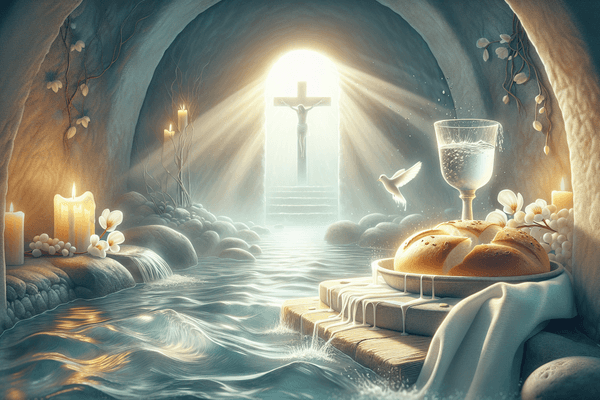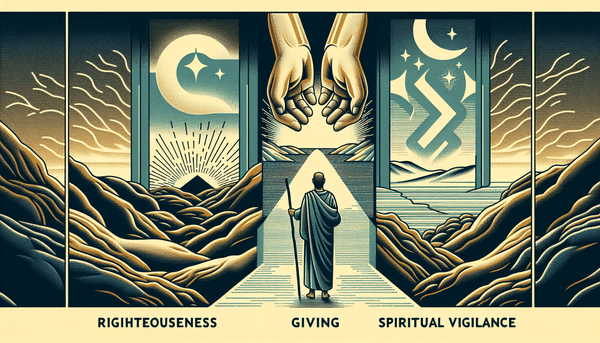Preparing for Baptism
As one approaches the sacred waters of baptism, it is essential to reflect on its profound meaning and implications. Baptism symbolizes spiritual cleansing and rebirth, akin to the transformative power of water. It is a rite that marks repentance and faith, as underscored in Mark 1:15, where the call to 'repent and believe in the gospel' is clear. This public declaration of faith is a significant step in the believer's life, symbolizing death to sin and a new life in Christ as beautifully described in Romans 6:4. The day before baptism, it is wise to spend time in prayer, confessing sins and seeking God's forgiveness, while also turning towards a life with God—a turning point echoed in Acts 2:38 and Galatians 3:27, where the promise of forgiveness and receiving the Holy Spirit is coupled with 'putting on Christ' in baptism.
Understanding Holy Communion
The Lord's Supper, or Holy Communion, is a practice given to those who have entered into a covenant with Jesus Christ, primarily those who have been baptized. This sacred meal, initiated by Christ during the Last Supper, serves as a profound remembrance of His sacrifice, encapsulated in the breaking of bread and the sharing of wine. As 1 Corinthians 11:27-29 cautions, participants should not take part in an unworthy manner but rather engage in self-examination, discerning the body of Christ. This act requires a heart that understands its significance, seen in the biblical context where baptism often precedes participation in Communion. The early church's devotion to breaking bread, as mentioned in Acts 2:42, highlights the importance of this ritual in the life of believers.
The Afterlife According to the Bible
Death is not the end, but a transition to judgment and the afterlife, as Hebrews 9:27 states that 'it is appointed for man to die once, and after that comes judgment.' The Bible provides a framework for understanding what lies beyond this life, offering both a warning and a promise. For believers who have embraced Jesus Christ as their Savior, the gospel of John 3:16 brings hope, affirming that they 'should not perish but have eternal life.' Conversely, for those who have rejected this offer, the Bible speaks of a separation from God. The afterlife is depicted as a time of reckoning, where eternal destinations are determined, as seen in the vivid imagery of Revelation 20:12-15, which portrays the final judgment before God.
The Use of Symbolic Elements for Protection
In the landscape of Christian belief, prayer and faith are paramount, serving as the believer's shield and fortress. The Bible does not advocate for the use of sea water or any other physical substance for spiritual protection, but rather emphasizes the power of faith and the efficacy of prayer. As believers, we are encouraged to seek refuge in God, our stronghold, and protector, as Psalm 18:2 declares. The New Testament also instructs us to don the 'armor of God' for spiritual protection against the forces of evil, as outlined in Ephesians 6:10-18. Trusting in God's provision for safety is a recurring theme, with Proverbs 18:10 portraying the name of the Lord as a 'strong tower' where the righteous can find security.
Conclusion
In conclusion, the practices of baptism and Holy Communion, alongside the teachings on the afterlife, are central to the Christian experience. They are not mere rituals but are imbued with deep spiritual significance that deserves thoughtful reflection and understanding. As we navigate our faith journey, it is crucial to approach these biblical teachings with a heart open to learning and a spirit willing to embrace the transformative power they hold. By doing so, we deepen our connection with the divine and fortify our commitment to walking in the path of righteousness, guided by the wisdom and grace of God.
FAQ
Q: What should I do the day before getting baptized?
A: The day before being baptized, it is a good idea to spend time in prayer and reflection, confess any known sins, seek God's forgiveness, and read relevant scriptures like Acts 2:38.
Q: What happens to people who have died?
A: According to Hebrews 9:27, after death comes judgment. Believers in Jesus Christ are promised eternal life (John 3:16), while the Bible speaks of a separation from God for those who have not accepted Christ.
Q: What is the significance of Holy Communion?
A: Holy Communion, or the Lord's Supper, is a practice for baptized believers to remember Jesus' sacrifice. It should be partaken with a heart that understands the act, as advised in 1 Corinthians 11:27-29.
Q: What is the biblical teaching on the use of water or other substances for protection?
A: The Bible does not specifically endorse the use of sea water or other substances for protection. Instead, it emphasizes faith in God and prayer, as seen in Psalm 18:2 and Ephesians 6:10-18, for spiritual protection.






